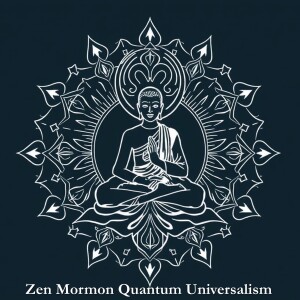
Thursday Feb 06, 2025
Embracing Diverse Spiritual Backgrounds
The Zen Mormon Quantum Universalist spiritual philosophy is designed to be deeply inclusive, embracing individuals from a wide range of faith traditions and belief systems. Remarkably, it is possible for practicing Mormons or Buddhists to actively participate in and adhere to the principles of this integrative framework while maintaining their involvement in their original faith communities.
This dual or nested spiritual identity can take several forms. Some individuals may choose to actively engage in both their original faith community (whether Mormon or Buddhist) and the Zen Mormon Quantum Universalist community, finding ways to harmonize the teachings and practices of these distinct traditions. They may emphasize the shared universal principles that underlie the different belief systems, rather than focusing solely on the doctrinal or institutional differences.
Others may maintain a more selective participation in their original faith, while devoting the majority of their spiritual practice and engagement to the Zen Mormon Quantum Universalist framework. They may continue to attend important cultural or community events within their original tradition, while primarily finding fulfillment and spiritual nourishment through the Zen Mormon Quantum Universalist teachings and community.
There are also those who begin their spiritual journey within their original faith tradition, but over time, gradually transition towards a deeper alignment with the Zen Mormon Quantum Universalist philosophy. During this transitional period, they may maintain limited involvement in their original tradition while increasingly devoting themselves to the Zen Mormon Quantum Universalist community.
Regardless of the specific approach, the key is to cultivate an attitude of respect, openness, and cross-pollination between the different spiritual frameworks. Adherents may find ways to integrate practices, insights, and community connections from both their original tradition and the Zen Mormon Quantum Universalist philosophy.
For example, a practicing Mormon could continue to participate in important Mormon rituals and community events, while also engaging in Zen meditation, studying the principles of the unitary field, and exploring the intersection of Mormonism and emerging technologies. Similarly, a Buddhist practitioner could maintain their regular zazen sessions and dharma study groups, while also incorporating Zen Mormon Quantum Universalist perspectives on the evolution of consciousness and the responsible development of transformative technologies.
This ability to hold multiple spiritual identities and affiliations with integrity and authenticity is a hallmark of the Zen Mormon Quantum Universalist approach, which embraces a pluralistic, non-dual worldview that recognizes the essential unity underlying the diversity of human spiritual and philosophical expressions.
In this article, we will delve deeper into the process of redefining spiritual authority within the Zen Mormon Quantum Universalist framework, exploring how the traditional, hierarchical structures of authority can be reimagined to align with the philosophy's emphasis on decentralization, experiential validation, and collective discernment. By cultivating a radically inclusive and participatory model of spiritual guidance, the Zen Mormon Quantum Universalist community can empower individuals from diverse backgrounds to engage in a transformative journey of personal and collective awakening.